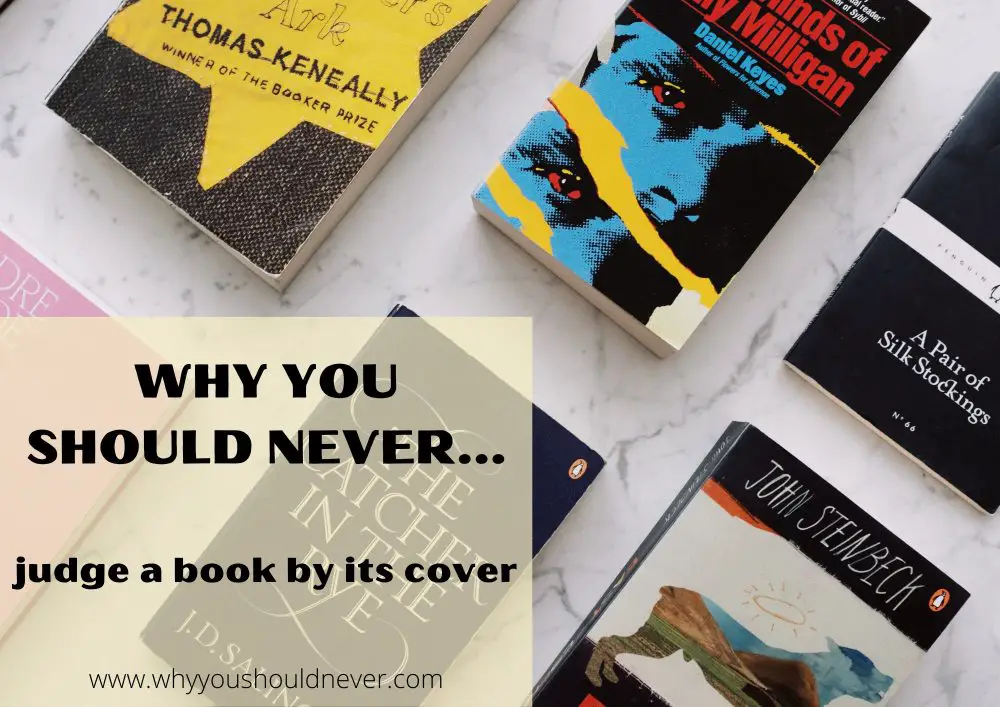![]()
Why You Should Never Judge A Book By Its Cover
We’ve all heard the phrase “don’t judge a book by its cover”, but what does that actually mean? In essence, it means that we shouldn’t make assumptions about something based on its appearance.
This phrase is applied to all sorts of situations, from the way someone looks to the way a product is packaged. And it’s good advice! After all, we know that first impressions can be wrong.
So why do we still judge books by their covers? Maybe it’s because we can’t help it! Our brains are hardwired to make split-second decisions based on very little information.
Today, we’re going to explore this saying in its literal sense.
7 reasons why you shouldn’t judge a book by its cover
The cover doesn’t tell you what the book is about
This may seem like an obvious point, but it’s worth mentioning! Just because a book has a beautiful cover doesn’t mean that it’s going to be a great read. Likewise, a book with a simple or uninspiring cover could be full of fascinating content.
Books often have very abstract or confusing covers that don’t give you any clues as to what they’re actually about, especially when it comes to fiction. And even when the cover does give you some idea of the book’s content, it’s usually not accurate.
The cover is designed to get the book to stand out and sell, not to provide an accurate summary of its contents. So don’t let the cover fool you – always read the blurb before you buy a book!
You might miss out on a great story
The most obvious reason not to judge a book by its cover is that you might miss out on a great story. Just because a book has a plain cover or an unappealing title doesn’t mean that it’s not worth reading.
Some of the most famous and popular books have very unassuming covers, and they’re only successful because people have taken the time to read them.
If you’re constantly judging books by their covers, then you’re probably missing out on some real treasures.
The writer usually has no say in the design
This is especially true for new or small-time authors who are published by larger companies. The writer usually has very little say in the design of their book’s cover, and they may not even see it until the book is already printed.
This oftentimes leads to covers that are completely different from what the author intended, and it can be just as frustrating for them as it is for you to look at.
The book designer may not have read the book
The book designer’s job is to come up with a cover that will sell the book, not to read it and try to sum it up in one image. So there’s a good chance that they haven’t even read the book they’re designing the cover for!
This means that they might not have any idea what the book is about, and they’re just going off of the brief they were given. This can lead to some very misleading or inaccurate covers.
A cover could never capture the whole book
You can’t expect a book’s cover to accurately represent everything that’s inside. A single image or phrase can never sum up an entire novel, no matter how cleverly designed it is.
At best, a book’s cover can give you a vague idea of what it might be about. But if you want to know for sure, you’re going to have to read it yourself.
Not enough money to make a good cover
Covers can cost thousands of dollars, particularly for genres like fantasy. That’s a lot of money. Small presses and self-published authors often don’t have the budget to hire a professional book designer, so they have to design the cover themselves or get someone to do it for free.
This can lead to some pretty amateurish-looking covers, but that doesn’t mean that the book itself is bad. You shouldn’t write it off just because the cover isn’t up to your usual standards. In many cases, a writer’s budget could have been spent on editing, proofreading, and marketing instead – all of which are more important factors in making a good book.
A lot of money spent on the cover
Of course, the inverse of the previous point is that there are some horrendous books with awesome covers, usually because more money was spent on the cover than anything else. So don’t let a book’s pretty face fool you, either.
Conclusion
As you can see, there are plenty of reasons why you shouldn’t judge a book by its cover. The next time you’re browsing the shelves, try to keep an open mind and read blurbs before making your final. You might be surprised at what you find!
